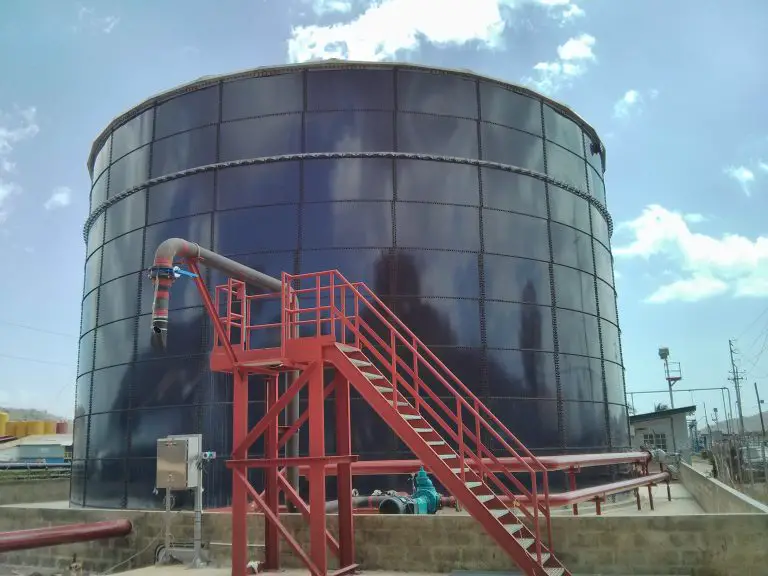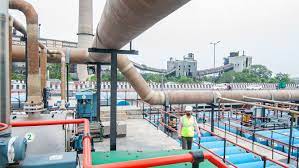An anaerobic digester is a microbiological wastewater treatment technology that uses organisms to distinguish and eliminate common pollutants. In the absence of oxygen, components for anaerobic absorption water recycling treatment are possible. Oxygen is created when the component is divided. Biogas replaced oxygen in this process. We are constructing Anaerobic Digester to meet a wide range of system needs. This process benefits low-maintenance and efficient control plants in a variety of ways. It could be an old-fashioned low-energy method of dealing with mechanical waste. Ultimately, we'll design and implement mechanical waste solutions that are low-cost and chemical-free. By recovering methane from waste, anaerobic assimilation helps to reduce nursery gas outflows. A waste treatment plant's design and operation differ depending on the type of trash it will handle.
WOG Group is already operating in some water treatment industries. It has provided us with a highly skilled team that is currently working on wastewater treatment via anaerobic absorption. It will reduce the total amount of natural matter in bodies of water. Anaerobic digesters are a previously untapped technology for treating mechanical discharge, wastewater, and sewage slime. We are looking into an anaerobic maintenance update that will allow us to produce biogas from common toxins or synthetic oxygen precursors in a manner more akin to the hunt for oxygen. Reducing the number of flavors used in manufacturing could aid in process optimization. Anaerobic Digesters reduce the number of greenhouse gases released into the atmosphere, which contributes to climate change.

Industries Employing Anaerobic Digesters To Manage Organic Waste
Anaerobic microscopic organisms are produced as a result of natural pollutants or chemical oxygen requirements. WOG Group, in particular, excels at providing comprehensive water treatment and administration solutions. In any case, we are working to make better use of our common resources, including water. Mechanical Water Recycling is undeniably a major concern for businesses. Installing an anaerobic digester in collaboration with analysts is one of the most established methods for treating water waste. Moreover, Anaerobic microscopic organisms convert natural pollutants or chemical oxygen requirements into biogas in an oxygen-free environment. We work on a variety of water treatment perspectives. We are developing anaerobic assimilation technology that can reduce natural matter slime by 50% to specifically meet the needs of our clients.
Anaerobic Bacteria Useful In A Variety Of Operations
Anaerobic bacteria are employed to remediate wastewater for companies because they break down organic waste that would otherwise end up in landfills or the ocean. Biodegradable materials contain carbon, which is a part of the carbon cycle. By using anaerobic digestion to produce methane instead of fossil fuels, we can reduce greenhouse gas emissions. It can use anaerobic organisms' digested feces as a soil conditioner, which will also help improve the soil's important nutrients.
Anaerobic Digestion Is Immensely Popular In India
WOG is working on an extension inquiry that will help our organization move forward with Water Purification. India has used anaerobic digestion with a variety of substrates, including sewage sludge, for many years. We believe that anaerobic digestion is the best option because it produces methane as well as electrical energy when burned in a gas engine. This is because aerobic treatment necessitates the use of ventilation, which requires the use of electrical energy. Anaerobic Digester requires temperatures above 25 ° C, which are almost always available in India. Eventually, a large wastewater sludge management system includes thickeners, digestion tanks, and sludge drying structures. The water decontamination framework line for the WOG Group will now include the mechanical divisions as well as the private ones.
The Effectiveness of Bacterial Decomposition Using An Anaerobic Digester
The main benefits of this technology are significant space savings, a reduction in liquid effluent emissions, and significant savings in liquid resources. Anaerobic therapy has several advantages over aerobic therapy, which are as follows:
- The anaerobic digester will consume very little energy.
- The reactor's surface area will decrease.
- Over time, industries will use fewer chemicals.
- The cost of sludge disposal will reduce anaerobic digester decomposition for bacteria.
- Different operations are using a variety of anaerobic Bacteria.
- To further guarantee that process water is properly sterilized before being put in a water channel, aerobic treatment is performed after anaerobic treatment.
Anaerobic Microorganisms At Work
- Complex organic substances are converted into simpler forms by the process of hydrolysis. (ex. proteins to peptides, polysaccharides to monosaccharides).
- Bacteria will use those basic molecules for a variety of purposes (including growth and survival), producing a variety of organic acids, alcohols, hydrogen, and carbon dioxide as a result of the acidogenesis process. After digesting organic acids and alcohol, other bacteria in the sewage expel hydrogen, carbon dioxide, and acetic acid (acetogenesis).
- Methanogenic bacteria break down acetic acid and carbon dioxide into methane.
The Implications of Anaerobic Digestion in Wastewater Management
Anaerobic Digester is a technique for recovering energy while earning money. Sludge from wastewater treatment plants is burned or landfilled, which releases greenhouse gases into the atmosphere. It is a source of money as well as a resource that is underutilized.
Biogas production from sewage sludge and trash generated by local food and agriculture improves overall system efficiency while providing economic and environmental benefits. Both utility operating costs and greenhouse gas emissions will be reduced overall. After all, the primary advantages of this technology include significant savings in liquid resources, reduced space requirements, and little to no wastewater.
There Are Various Sewage Treatment Techniques
Because of our available Anaerobic Treatment frameworks, we will be the world's best therapeutic invention. Depending on the wastewater conditions, we provide implemented slime preparation in High-impact innovation, which employs fine bubble diffused air circulation, aerators, or fly air circulation systems. The primary preferences of this strategy are vital fluid asset reserve money and no fluid discharge. We offer film processes with submerged or uncovered layers for high-end treatment needs. After the wastewater treatment plant removes suspended particles and breaks down natural particles, we dispose of the slime. People may have difficulty arranging sewage if this does not occur.
Best Solutions By Wog Group Depending Upon Latest Technologies
Customers regard the company as one of the most advanced manufacturers of Industrial Water Treatment Plants. We use less energy in our Wastewater Treatment For Industrial Processes. Uses only a few chemicals to produce high-quality water. Furthermore, businesses are changing their production methods to reduce wastewater, which results in proper production research procedures. WOG Innovation offers the most effective solutions. Finally, companies that generate wastewater may benefit from WOG Group solutions. We are currently attempting to do justice to our future missions. As a supplier, we offer the option of Water Recycling and efficient use. We are a leading manufacturer of Wastewater Treatment Plants, having completed numerous successful industrial process projects.
As a result, it committed us to meet the performance, schedule, and cost goals of our industry operators. We assist our customers in adjusting to new environmental requirements while also responding to changing regulatory norms across a broad and distinct spectrum of processing operations. The ultimate goal of the WOG Group is to provide solutions for a wide range of Wastewater Treatment Plants and management services. We want to make the best use of natural resources such as water.
0





